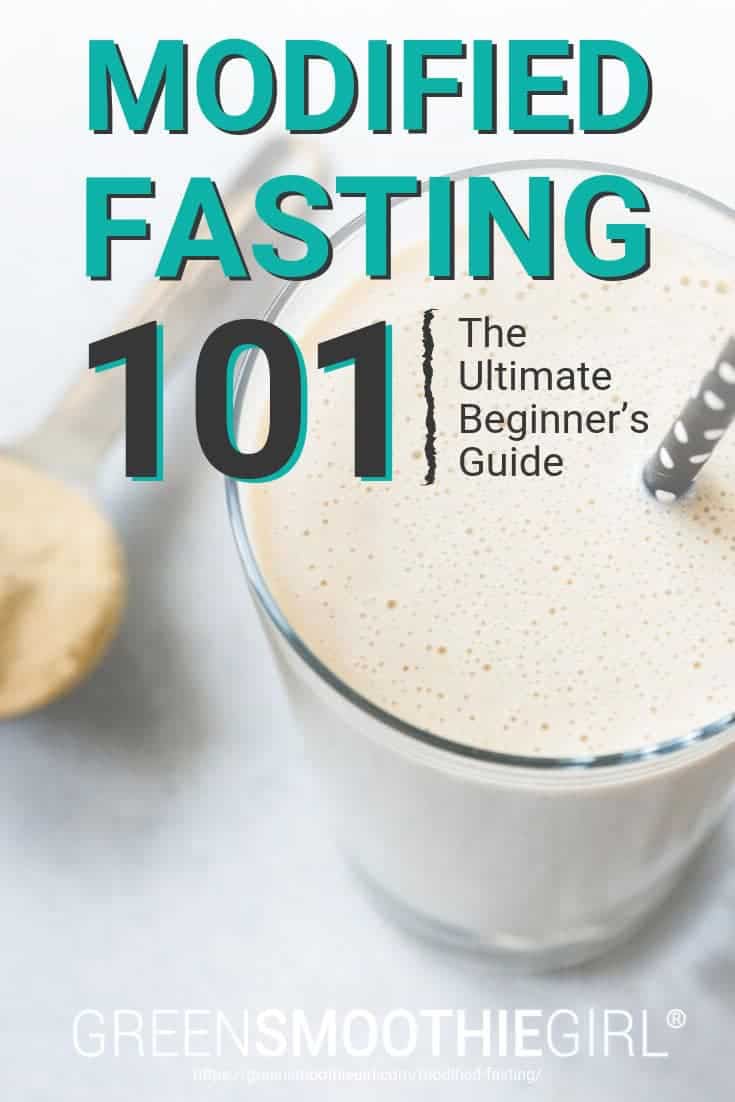Modified Fasting 101: The Ultimate Beginner’s Guide

If you’re like most people, the idea of going without food for a day — or even longer — doesn’t sound very sexy.
But unless you’ve been living under a rock, you’ve probably heard about the incredible health benefits of fasting.
Maybe you know that in 2016, the Nobel Prize for Medicine was awarded for new research that revealed exactly why fasting is so powerful1 (more on that below!).
So what if I told you that it was possible to get the benefits of fasting without going hungry (or getting hangry)?
Intrigued? You should be! Let’s talk about modified fasting.
In this article:
- What Is Modified Fasting?
- How Does Modified Fasting Work?
- Frequently Asked Questions About Modified Fasting
- The Unique Benefits of Modified Fasting
- Advantages of a Modified Fast vs. Longer Fasts
- Tips for a Successful Modified Fast
- Conclusions about Modified Fasting
What Is Modified Fasting?
Modified fasting is a type of intermittent fasting2 that gives you a budget of 600-800 calories a day, for three or more days, and restricts eating to an 8- to 12-hour window.
Of course, those calories can’t come from DingDongs. You need a power-packed, plant-based meal plan that includes the right balance of carbohydrates, protein, fat, and micronutrients (more on that in a minute, too).
In the recent past, a lot of experts argued that fasting had to be strict (no calorie intake whatsoever) to be most effective. However, a tidal wave of human and animal clinical studies, as well as new breakthrough research from Valter Longo, PhD, shows that modified fasting yields the same health benefits of a zero-calorie water fast,3 including weight loss, mental clarity, reduced inflammation, and cellular renewal and repair.
How Does Modified Fasting Work?
In 2016, Japanese biologist Dr. Yoshinori Ohsumi won a Nobel prize for discovering a very specific cellular repair process called autophagy.1
And that strange-sounding little word is the reason that fasting (including modified fasting) is so effective. The word “autophagy” is a combination of the words “auto” (self) and “phagy” (eating). In other words, “autophagy” literally means “self-eating.”
See, your body is a true marvel of design. When calorie consumption cuts off or stays below that magic 800-calorie mark (including during sleep, while you’re sick, or when you're intentionally fasting), your system starts recycling its own cells, literally destroying and consuming damaged or dying cells to make way for new, healthy cells.
Your body also attacks fat cell accumulations as the least needed, cancerous growths we all have, along with viral and bacterial cell clusters that could make us sick. Basically, freed from having to break down food all day every day, the body goes to work repairing.
Your miraculous, self-regulating body, in a fasting state, goes into Marie Kondo mode, clearing out whatever doesn't serve you.
It’s the reason our need for sleep has as much to do with fasting as it does REM cycles. It’s also the reason we intuitively cut WAY down on calories when we’re feeling really sick.

Modified fasting is a great way to capitalize on the natural benefits of autophagy.
Frequently Asked Questions About Modified Fasting
If you have a lot of questions right about now, you’re not alone. The internet, the blogosphere, and the publishing world have exploded with information about fasting — intermittent fasting, water fasting, time-restricted eating, and others.
So, what makes modified fasting so great? How is it different from intermittent fasting? What advantages does it have over a longer fast, or a water-only fast? Can you really lose weight (and how much)? How often should you do it? What should you eat and drink? What should you be eating afterward?
I’ve got you covered.
When it comes down to it, the optimal amount of time to fast is the amount of time a person can realistically spend in autophagy, considering both physical and mental factors. (In other words, you’ve still got to do life — and that has to factor into your fasting plans.)
While a week-long, zero-calorie water fast is fantastic for your health, it’s not realistic for most people with a busy work schedule and family life. Based on my research, a three-day modified fast is the right mix of doable and highly impactful for your health. I find that people fall off and feel like a failure when they attempt 5 days of modified fasting, but virtually everyone finishes strong with 3 days.
The Unique Benefits of Modified Fasting
The benefits of modified fasting3 are right on par with the benefits of water fasting. And most importantly, these benefits are accessible and doable for the average, busy person.
Fasting Compatible with Modern Life
I can tell you right now that water fasting isn’t easy. There’s a reason that I (and others) attend fasting clinics instead of staying at home with easy access to the refrigerator!
Modified fasting, on the other hand, requires zero white-knuckling and can be done while traveling, caring for children, working, and everything else that's part of your everyday life.
If you feel up to a water-only fast or a longer modified fast, I’m your biggest cheerleader. But for those of you who think “there’s no way I could fit an extended water fast into my life,” modified fasting is an amazing choice.

Doable, Non-Threatening, and Easy
Going completely without food for any stretch of time isn’t doable for most people. But a very specific, low-calorie fast on the other hand? That’s manageable.
Especially given that the research shows eating an optimized, low-calorie (650-800 calories, to be exact) diet during a short-term fast yields the same benefits of a water-only fast—along with being far more doable.
You won’t even be particularly hungry.
Modified fasting basically lets you have your carrot cake and eat it too. (Or at least your carrot. No cake. Sorry.)
Cell Repair and Waste Management
Even if you’re eating a mostly raw, nutrient-dense diet, your body is still working hard to run damage control on waste buildup and cellular damage that comes from oxidative stress, the chemical load in your environment, and even normal biological processes like digestion.
Fasting cuts down on the enormous amount of energy required for digestion and opens the door for cell repair and waste removal.5
It’s one of the reasons we need sleep so much when we’re sick or stressed out: to give our bodies a chance to manage repairs and waste removal without the burden of actively digesting a full load of calories.
During a modified fast, you’ll choose an 8-12 hour eating window (during which you’ll consume all of your 5 daily mini-meals) to allow your body plenty of time to rest from digestion and spend the maximum amount of time in autophagy.
Reduced Inflammation
A modified fast can significantly lower inflammation and oxidative stress.6
On an average day of digestion, your mitochondria (the energy-production centers in your cells) process quite a bit of glucose from the food you eat, which inevitably creates byproducts known as free radicals (unstable molecules that cause cell and organ damage), as well as cells called monocytes, which trigger inflammation.7
The average person’s basal metabolic rate is between 1400-1600 calories per day (that’s how many calories you burn during a given day just by being alive). During a modified fast, you’ll be eating significantly fewer calories, significantly less glucose, and producing significantly fewer free radicals and monocytes during digestion.
Many people with inflammatory conditions like arthritis, Crohn’s, irritable bowel syndrome, and psoriasis8 notice improvements during and after a fast for this reason.
Flush Toxins and Chemicals
The average person is exposed to around 80,000 different chemicals in the air, food, and water.9 And you’d better believe that chemical load has an impact.
Our bodies are amazingly adept at protecting us from the harmful effects of those chemicals, by tucking them away in fat stores10 where they can’t damage our organs. But in modern society, it’s difficult for our bodies to keep up with the number of chemicals in the plastics, metals, drugs, food, air, and water we interact with on a daily basis.
Disease is the direct result of chemical overload, and fasting can be a literal lifesaver in helping our bodies play catch-up with a chemical-saturated environment.
Weight Loss and Reduced Fat Marbling in Organs
Modified fasting is one of the easiest, most effective ways to lose weight (especially abdominal fat!) quickly.4 The average person who participated in my Flash Fast program lost 4 pounds in three days.
And no, that’s not just “water weight.” During autophagy, your body goes after fat stores first — particularly abdominal fat stores — 3 along with recycling and destroying damaged tissues and cells for fuel.
Fasting also helps improve fatty liver syndrome,25 which results in fat marbling you can’t see in your liver and other internal organs. Fatty liver syndrome puts a big strain on blood circulation and hurts your liver’s ability to flush toxins and chemicals from your body.
Improved Mood and Brain Health
New research shows that fasting (including modified fasting!) can be as effective as antidepressants11 in improving mood and mental health. Many researchers believe that the process of autophagy in the brain’s neurons is responsible for the findings.
Other studies show that temporary calorie restriction through modified fasting boosts brain-derived neurotrophic factor12 (which in animal studies helps protect neurons in the brain against damage, stress, and dysfunction from neurodegenerative disorders), as well as encouraging the growth of new neurons. Regular fasting in mice produces new nerve growth in the hippocampus (the place we create new memories), as well as improved cognition.
Protects and Restores Nerve Cell Function
Nerve cells rely on a special kind of insulation, called a myelin sheath, to properly communicate with each other. The condition Multiple Sclerosis (MS) develops as these myelin sheaths erode, making it difficult and ultimately impossible for nerves to carry information and communicate with each other.
No drug on the market has been able to successfully restore these myelin sheaths. But as it turns out, fasting can do what drugs can’t. One clinical trial showed that fasting can reverse damage from Multiple Sclerosis 13 to the fatty tissues that protect and insulate nerve cells, actually helping rebuild the myelin sheaths.14

Immune Boost and Protection Against Disease
Fasting provides a significant immune boost, partly because during autophagy, your body is actively scavenging for damaged, mutated, or low-functioning cells, and partly because a fast helps reset important metabolic and neurological pathways. When those pathways are working effectively, your microbiome, enzymes, and hormones can more effectively flush toxins, repair damage, and convert food into energy.
A study in 2019 showed that fasting mice were able to destroy pathogens in about two days,15 while their well-fed counterparts took an entire week to do the same thing. And a 2014 study showed that fasting causes dormant stem cells involved in immune functions to regenerate.16
Research shows that fasting can help animals recover from bacterial infections17 more quickly. It’s also been shown to improve cardiovascular health, diabetes, neurodegenerative conditions, autoimmune diseases, and even cancer.
It turns out “starve a fever, feed a cold” is a little misleading. You should starve a cold, too! The immune system becomes strong and energized to metabolize the viral or bacterial colonies, helping you get well quickly and avoid longer-term consequences like pneumonia or deep respiratory congestion.
Longer Lifespan
Numerous studies show how fasting and intermittent calorie restriction increase lifespan in animals from mice to chimpanzees.18
And while there aren’t any conclusive human studies, scientists are confident that these principles apply to people, too.
When you look at all of the different health benefits of fasting (cell repair, waste management, immune health, lowered inflammation, and better mental health), it’s no wonder!
Advantages of a Modified Fast vs. Longer Fasts
While a shorter fast is obviously more doable and compatible with a busy modern life, there are a few other important advantages to consider as well.
Basically, there’s no need to feel like you’re selling yourself short or “taking the easy way out” by fasting for shorter periods of time on a regular basis, rather than all at once during a strict water-only fast. Here’s why!
No Risk of Muscle Wasting
While your body can easily go for long periods of time without consumed fuel (several weeks, actually), it can’t run on fat stores alone. Your brain relies heavily on glycogen to function.23 During water-only fasts that last up to three days, your body can rely on stores of glycogen in the liver, combined with fat stores. However, longer fasts without any other food force the body to start breaking down muscle tissue/protein for glycogen. Shorter modified fasts of 3-5 days won’t dip into muscle stores for that precious glycogen!
Maintains a Healthy Metabolism
A longer water-only fast can slow down your metabolism, since your body will be working to conserve energy. There’s no long-term harm from this, as long as you don’t do water fasts regularly. However, one of the advantages of a shorter modified fast is that it can be done much more regularly without fear of slowing the metabolism.4
Avoids Complications of Refeeding Syndrome
Longer, water-only fasts can, in rare circumstances, result in a dangerous condition known as refeeding syndrome.24 This syndrome is caused by a sudden influx of calories that leads to a drastic imbalance in electrolytes in the body. In very rare situations, refeeding syndrome can be deadly.
While it is important to re-enter a normal diet after fasting with special care to nutrients and organic foods, there’s no risk of refeeding syndrome after a shorter, modified fast.
Flexibility and Compatibility with Daily Life
I can tell you from personal experience that it’s very difficult to undertake a water-only fast without serious focus (and sometimes isolation). A modified fast allows you to stay social and keep up with work and everyday activities (like making dinner for your family), without calling it quits on your fast or feeling overwhelmed.
Tips for a Successful Modified Fast
While fasting for three days is doable for most people, you’ll have the very best chance of success if you keep the following tips in mind:
Stay Hydrated
While you’re fasting, your body will be working hard to flush toxins and waste from your system more aggressively than usual. That means you’re going to go through electrolytes and liquids more quickly. Stay hydrated, and keep your electrolyte levels high by spreading your mini meals out evenly throughout the day. If you feel light-headed, or have a headache, sip on some lemon water or celery juice, which are low- or zero-calorie but rich in electrolytes.
Listen to Your Body
Listen to your body’s signals during a fast! Rest as needed, plan plenty of time for high-quality sleep, and don’t panic if you notice some of those Herxheimer reactions we talked about earlier. Headaches and tiredness early on in the process are very normal, and they will pass. Your body is doing important work!
Find Your Cheerleaders
A support group can make all the difference to success by helping you find answers to questions that may arise during a modified fast.
Conclusions About Modified Fasting
The research is in, and there’s no doubt that fasting is one of the most important health discoveries of this century.1 In a modern world filled with chemicals, processed food, and 24/7 snacking, fasting gives our bodies a chance to “take out the trash,” as well as renew, rebuild, and recycle damaged cells.
Modified fasting makes the benefits of fasting accessible to almost anyone, in a way that’s compatible with real life. Whether you’re interested in losing weight, clearing out damaged cells and toxins from your body, fighting disease, reducing inflammation, or improving your mental health, modified fasting is one of the best things you can do for your health.
[Related: 9 Tips For Sailing Through A 3-Day Modified Fast]
Listen Next: Vibe Episodes 146 & 147: How To Get The Remarkable Benefits of Fasting--Without Going Hungry!” With Robyn Openshaw

Disclosure: This post may contain affiliate links that help support the GSG mission without costing you extra. I recommend only companies and products that I use myself.

Sources
- Levine B, Klionsky DJ. Autophagy wins the 2016 Nobel Prize in Physiology or Medicine: Breakthroughs in baker's yeast fuel advances in biomedical research. Proc Natl Acad Sci U S A. 2017;114(2):201–205. doi:10.1073/pnas.1619876114
- Ganesan K, Habboush Y, Sultan S. Intermittent Fasting: The Choice for a Healthier Lifestyle. Cureus. 2018;10(7):e2947. Published 2018 Jul 9. doi:10.7759/cureus.2947
- Longo, V. D., & Mattson, M. P. (2014). Fasting: molecular mechanisms and clinical applications. Cell metabolism, 19(2), 181–192. doi:10.1016/j.cmet.2013.12.008.
- Fung, Jason Dr. How to Fix Your Broken Metabolism by Doing the Exact Opposite. Intensive Dietary Management.
- Anton SD, Moehl K, Donahoo WT, et al. Flipping the Metabolic Switch: Understanding and Applying the Health Benefits of Fasting. Obesity (Silver Spring). 2018;26(2):254–268. doi:10.1002/oby.22065
- Martin B, Golden E, Egan JM, Mattson MP, Maudsley S. Reduced energy intake: the secret to a long and healthy life?. IBS J Sci. 2007;2(2):35–39.
- Jordan, Stefan. Dietary Intake Regulates the Circulating Inflammatory Monocyte Pool. (2019). Cell.
- Berger, Matt. “How Intermittent Fasting Can Help Lower Inflammation.” Heathline. August 22, 2019.
- Fitzgerald, Randall. The Hundred-Year Lie: How to Protect Yourself from the Chemicals That Are Destroying Your Health. Dutton. 2006.
- Jackson E, Shoemaker R, Larian N, Cassis L. Adipose Tissue as a Site of Toxin Accumulation [published correction appears in Compr Physiol. 2018 Jun 18;8(3):1251]. Compr Physiol. 2017;7(4):1085–1135. Published 2017 Sep 12. doi:10.1002/cphy.c160038
- Gassen NC, Rein T. Is There a Role of Autophagy in Depression and Antidepressant Action?. Front Psychiatry. 2019;10:337. Published 2019 May 15. doi:10.3389/fpsyt.2019.00337
- Mattson MP. Energy intake, meal frequency, and health: a neurobiological perspective. Annu Rev Nutr. 2005;25:237–260
- University of Wisconsin-Madison. "Discovery opens new opportunities to slow or reverse multiple sclerosis." ScienceDaily. ScienceDaily, 27 November 2018.
- Choi, I. Y., Piccio, L., Childress, P., Bollman, B., Ghosh, A., Brandhorst, S., … Longo, V. D. (2016). A Diet Mimicking Fasting Promotes Regeneration and Reduces Autoimmunity and Multiple Sclerosis Symptoms. Cell reports, 15(10), 2136–2146. doi:10.1016/j.celrep.2016.05.009
- Collins, Nicholas. The Bone Marrow Protects and Optimizes Immunological Memory during Dietary Restriction. (2019). Cell.
- Cheng, Chai-Wei. Prolonged Fasting Reduces IGF-1/PKA to Promote Hematopoietic-Stem-Cell-Based Regeneration and Reverse Immunosuppression. (2014). Cell Stem Cell.
- Mohapatra, Sipra, et. al. “Short-term starvation and realimentation helps stave off Edwardsiella tarda infection in red sea bream (Pagrus major).” Comparative Biochemistry and Physiology Part B: Biochemistry and Molecular Biology. Volume 206, April 2017, pages 42-53.
- Heilbronn L.K., de J.L., Frisard M.I., DeLany J.P., Larson-Meyer D.E., Rood J., Nguyen T., Martin C.K., Volaufova J., Most M.M., et al. Effect of 6-month calorie restriction on biomarkers of longevity, metabolic adaptation, and oxidative stress in overweight individuals: A randomized controlled trial. JAMA. 2006;295:1539–1548. doi: 10.1001/jama.295.13.1539.
- Brandhorst S, Longo VD. Fasting and caloric restriction in cancer prevention and treatment. Recent Results Cancer Res. 2016;207:241-266. doi:10.1007/978-3-319-42118-6_12
- Cheng, Chia-Wei et al. Fasting-Mimicking Diet Promotes Ngn3-Driven β-Cell Regeneration to Reverse Diabetes. Cell. 02/2017.
- Cheng, C. W., Villani, V., Buono, R., Wei, M., Kumar, S., Yilmaz, O. H., … Longo, V. D. (2017). Fasting-Mimicking Diet Promotes Ngn3-Driven β-Cell Regeneration to Reverse Diabetes. Cell, 168(5), 775–788.e12. doi:10.1016/j.cell.2017.01.040.
- Wei, Min et al. Fasting-Mimicking Diet and Markers/Risk Factors for Aging, Diabetes, Cancer, and Cardiovascular Disease. Science Translational Medicine. 02/2017.
- Mathieu C, Li de la Sierra-Gallay I, Duval R, et al. Insights into Brain Glycogen Metabolism: THE STRUCTURE OF HUMAN BRAIN GLYCOGEN PHOSPHORYLASE. J Biol Chem. 2016;291(35):18072–18083. doi:10.1074/jbc.M116.738898
- Mehanna HM, Moledina J, Travis J. Refeeding syndrome: what it is, and how to prevent and treat it. BMJ. 2008;336(7659):1495–1498. doi:10.1136/bmj.a301
- Ebrahimi S, Gargari BP, Aliasghari F, Asjodi F, Izadi A. Ramadan fasting improves liver function and total cholesterol in patients with nonalcoholic fatty liver disease. Int J Vitam Nutr Res. 2019 Apr 1:1-8. doi: 10.1024/0300-9831/a000442.
Posted in: Fasting, Lifestyle, Tools & Products, Whole Food















